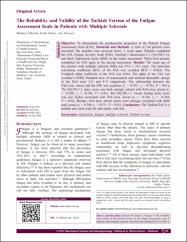The reliability and validity of the Turkish version of the fatigue assessment scale in patients with multiple sclerosis a; b Send mail to Özden F.;
Citation
Ozkeskin, Mehmet; Özden, Fatih1,; Yüceyar, Nur2. The Reliability and Validity of the Turkish Version of the Fatigue Assessment Scale in Patients with Multiple Sclerosis. Neurological Sciences and Neurophysiology 39(2):p 109-114, Apr–Jun 2022. | DOI: 10.4103/nsn.nsn_142_21Abstract
Objective: To demonstrate the psychometric properties of the Turkish Fatigue Assessment Scale (FAS). Materials and Methods: A total of 104 patients were recruited. The patients were assessed twice, 1 week apart. Patients completed the FAS, Fatigue Severity Scale (FSS), EuroQol-5 dimensions-3 L (EQ-5D-3 L), and Beck Depression Scale (BDS) in the initial assessment. Thirty-four patients completed the FAS again in the second assessment. Results: The mean age of the patients with multiple sclerosis (MS) was 37.6 ± 10.1 years. The intraclass correlation coefficient (ICC) of the FAS was excellent (ICC = 0.812). The Cronbach alpha coefficient of the FAS was 0.914. The alpha of the FAS was excellent (>0.80). Standard error of measurement and minimal detectable change of the FAS were 3.51 and 9.73 respectively. The relationship between the FAS (test, retest) and the FSS was excellent (r1 = 0.767, r2 = 0.782, P < 0.01). The EQ-5D-3 L index score was both strongly related with FAS (test, retest) (r1 = -0.500, r2 = -0.745, P < 0.01). The EQ-5D-3 L Visual Analog Scale score was also highly correlated with FAS (test, retest) (r1 = -0.536, r2 = -0.764, P < 0.01). Besides, FAS (test, retest) scores were strongly correlated with BDS total scores (r1 = 0.540, r2 = 0.571, P < 0.01). Conclusions: The Turkish FAS is a reliable and valid scale for individuals with MS.


















